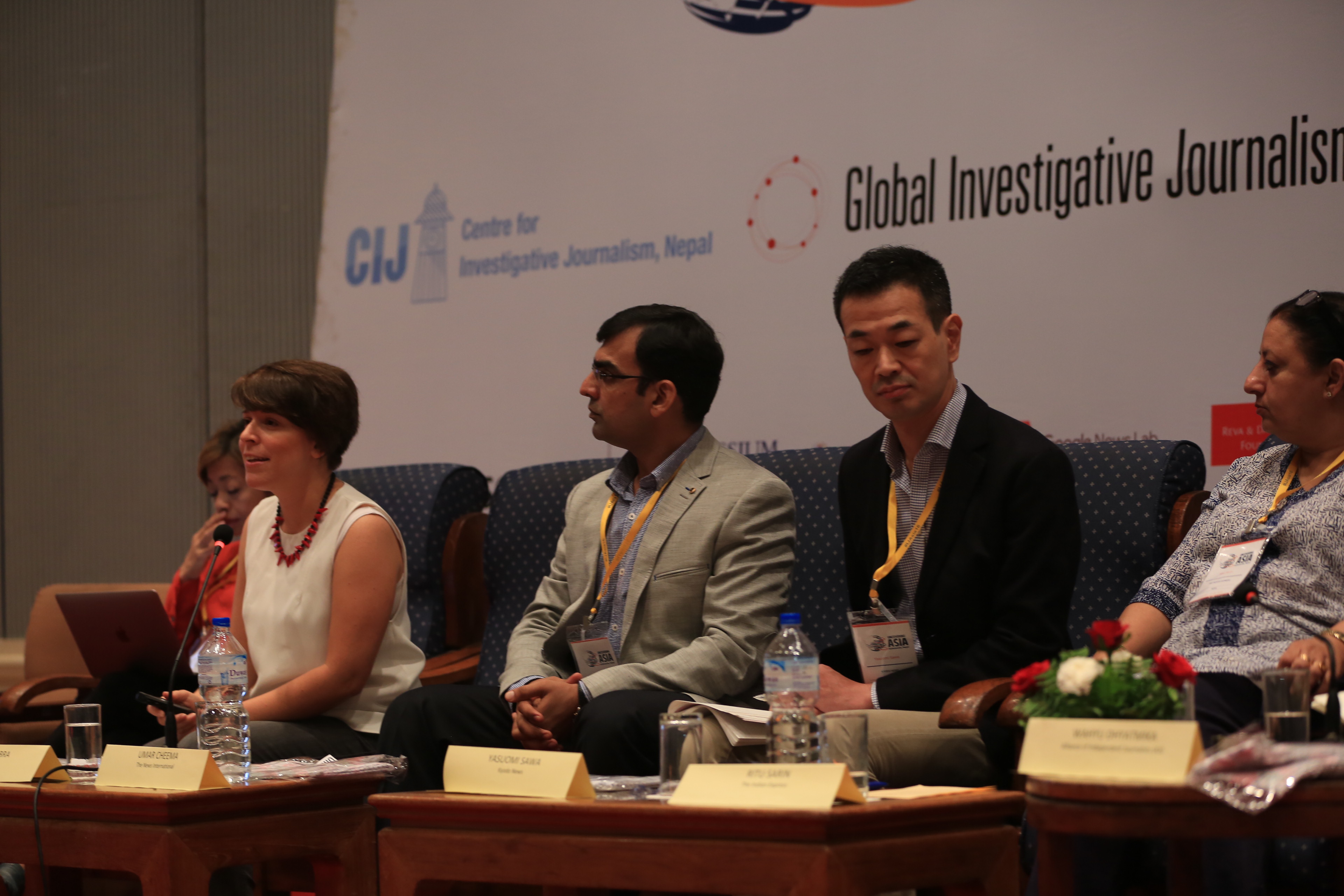
ICIJ’s Mar Cabra is joined on stage by journalists who worked on the Panama Papers investigation. “It’s the story that has shaken the world,” said Sheila Coronel, director of Columbia University’s Stabile Center for Investigative Journalism, who moderated the panel. Photo by Milan Poudel.
The Panama Papers – the biggest leak in journalism history that sparked government-level investigations and resignations in multiple countries – showed that massive electronic leaks are “the new normal” in journalism, top investigative reporters said Friday.
The second Asia Investigative Journalism Conference (#IJAsia16) opened in Kathmandu, Nepal Friday, with some of the reporters behind Panama Papers stories hailing cross-border, collaborative data journalism as key to the future of investigations.
“We are in an era where massive electronic leaks are the new normal. We’ve heard of Wikileaks, NSA documents, Panama Papers. You can see they are coming faster and bigger and there are more yet to come,” said Mar Cabra of the International Consortium of Investigative Journalists (ICIJ), which led the multi-national journalistic investigation.
The Panama Papers, a trove of 11.5 million leaked files from the Panama-based law firm Mossack Fonseca, is the largest release of information about offshore companies to date. Published in April, the data provided a window into the financial dealings of politicians, business people, and celebrities who parked their assets offshore.
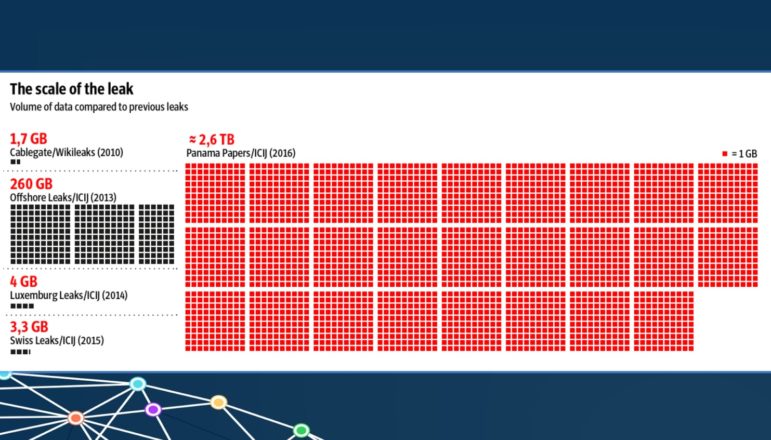
A slide from presentation by ICIJ’s Mar Cabra shows the scale of the Panama Papers data, the largest leak in journalism history.
During the panel, Panama Papers’ Asia team discussed how 400 journalists in 80 countries worked together in the biggest collaboration in journalism history, what fellow muckrakers can learn, and why such leaks are the future of journalism.
Technology and Trust
A leak of 2.6 terabytes of data to German newspaper Süddeutsche Zeitung overwhelmed the ICIJ, which tapped a global network of journalists to help process the information.
Cabra, head of ICIJ’s data and research unit, said two things were crucial to the team’s work: technology and trust.
Using their own social network called Global I-HUB, journalists shared leads, tips, files and links – facilitating collaboration to pursue leads on the local level and visualize connections from one country to the next.
“All this is based on open source software that’s already out there. The social network was created for dating. It’s interesting how we can reuse technology as software and adapt it to our needs,” Cabra said.
Trusting the journalists to not break stories until the agreed-upon publication date of April 3, 2016 ensured the project’s success. “We ended up a big family working together, like the [Three] Musketeers. You don’t betray your family. That’s how we kept it a secret,” Cabra said.
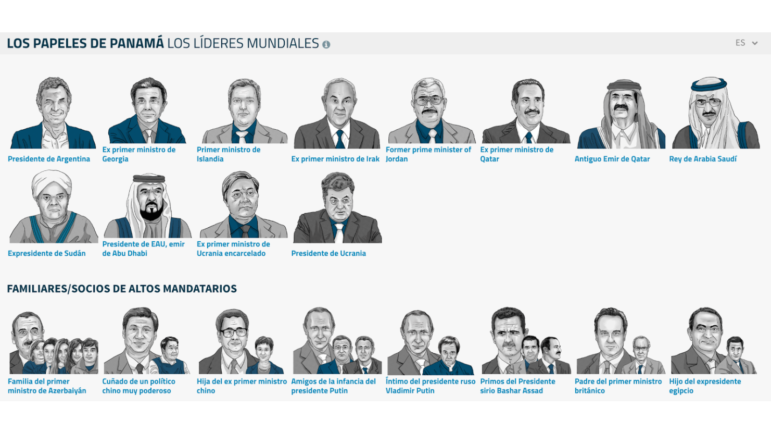
ICIJ’s Mar Cabra said journalists and media partners behind the Panama Papers shared information and visualization tools. Slide from Cabra’s presentation at Uncovering Asia 2016.
Collaboration Over Competition
Working with fierce rivals was another element of the Panama Papers that journalists like Kyodo News deputy editor Yasuomi Sawa described as a new normal.
Sawa said he had to exchange information with his toughest competitor at another Japanese news outlet The Asahi Shimbun after years of “intense competition.”
“It was quite strange really. This is my very first time to work in a collaborative manner with him. I never expected such work,” he said, referring to his rival and drawing laughter from the audience.
Indonesia’s Wahyu Dhyatmika said collaborating with regional counterparts was a lesson for journalists in Jakarta too, along with digital security.
“We were trained to secure our communications,” he said of the project where journalists had to enter codes and passwords to access the database.
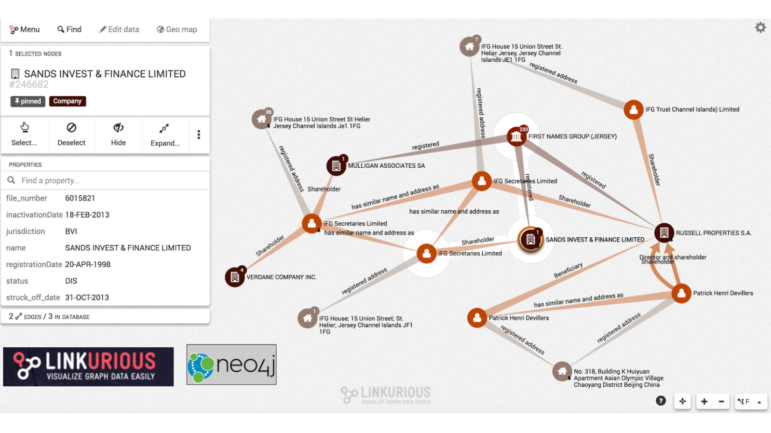
ICIJ’s Mar Cabra says journalists connected the dots between countries to work on the Panama Papers. Slide from Cabra’s presentation at Uncovering Asia 2016.
‘Leaks Are Not Static Documents’
Besides security, dealing with publishers and advertisers was a challenge in Pakistan, said The News International investigative reporter Umar Cheema.
After a discussion, Cheema named his own publisher along with politicians whose names came up in the Panama Papers leak.
The publisher said, “I will give you my documents and you can see the company was formed and dissolved in the same year without doing any business,” Cheema recalled. “For me, the name bigger than the prime minister was my publisher’s name,” he added.
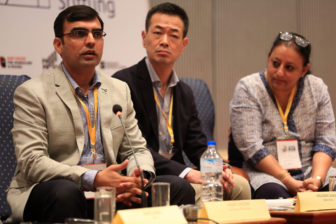
Milan Poudel
Umar Cheema discusses the fallout in Pakistan from his reporting on the Panama Papers. Photo by Milan Poudel.
Advertisers pulled out when their names were listed in the reports, according to Cheema. “The biggest threat to the press freedom is from the corporate side. We didn’t face so much heat from the political side but we lost three, four advertisers,” he said.
In India, reports sparked the creation of a special task force to look into the Panama Papers revelations, and prompted more leads for journalist Ritu Sarin of The Indian Express.
“It is still an ongoing story. The Panama Papers were not static documents. A single document leads you to an attachment and to another attachment and another,” she said.
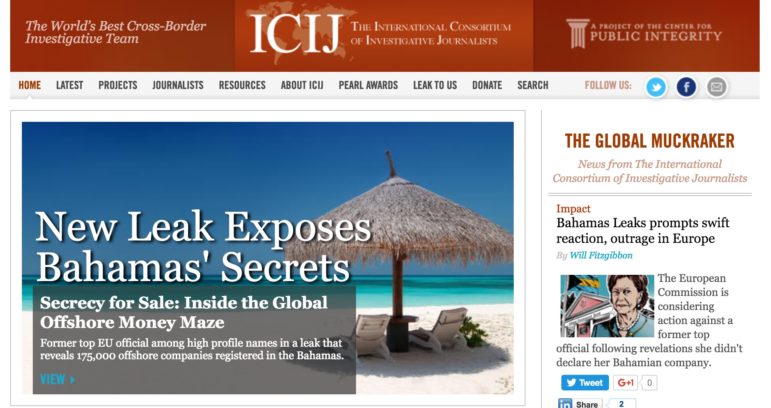
Bahamas Leaks is the latest collaborative project led by ICIJ and was published this week. Screenshot of ICIJ website.
More Leaks to Come
ICIJ’s Cabra encouraged the 350 journalists in the audience to dig into the data made available online, saying leaks and data journalism form a sustainable news model.
“The world is electronic so it’s easier than ever to leak anything from public institutions and the corporate world. And it’s easier to get them to journalists. Media organizations are getting secure leaking platforms to receive information easily,” Cabra said in an interview following the panel.
On the heels of the Panama Papers, ICIJ this week published Bahamas Leaks, a cache of documents on offshore companies from the corporate registry of the Bahamas, one of the most secretive jurisdictions in the world.
Cabra suggested journalists should prepare for the new normal.
“Any journalist today should have basic data journalism skills, basic cybersecurity skills and be open to sharing with colleagues and not be a lone wolf anymore,” Cabra said.
 Ayee Macaraig is a Manila-based journalist covering politics and international affairs. She is a correspondent of the French news agency Agence France-Presse (AFP).
Ayee Macaraig is a Manila-based journalist covering politics and international affairs. She is a correspondent of the French news agency Agence France-Presse (AFP).
Ayee reported on this event as part of the IACC Young Journalists Initiative, a network reporting on corruption around the globe.
